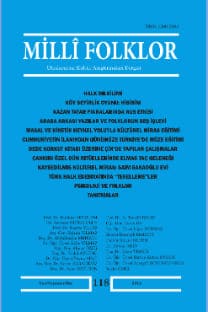BİZDEN BİRİ, CASUS YA DA ARAŞTIRMACI? NİTEL SAHA ARAŞTIRMASI VE ARAŞTIRMACI KİMLİĞİNİN BAĞLAMSAL KONUMLANDIRMA BİÇİMLERİ
Insider, Spy or Researcher? Qualitative Field Research and Contextual Positionings of Researcher’s Identity
___
- Adler, Patricia A. ve Peter Adler. Membership Roles in Field Research. Sage Publications, 1987.
- Atay, Tayfun. Batı’da Bir Nakşi Cemaati-Şeyh Nâzım Kıbrısî Örneği. İstanbul: İletişim Yayınları, 1996.
- Atay, Tayfun. “Sunu”. Etnografik Hikayeler. (Haz.) R. Harmanşah ve N. Nahya. İstanbul: Metis Yayınları. 2016: 9-15.
- Atkinson, Paul ve David Silverman. “Kundera’s Immortality: The Interview Society and The Invention of Self”. Qualitative Inquiry 3 (1997): 304-325.
- Baker, Carolyn D. “Ethnomethodological Analyses of Interviews”. Handbook of Interview Research: Context & Method, Sage Publications, 2002: 777-795.
- Bauman, Richard. “Verbal Art as Performance”. American Anthropologist 77/2 (1975): 290- 311.
- Bauman, Richard. Story, Performance, and Event: Contextual Studies of Oral Narrative. Cambridge: Cambridge University Press, 1989.
- Briggs, Charles L. Learning How to Ask: A Sociolinguistic Appraisal of the Role of the Interview in Social Science Research. New York: Cambridge University Press, 1990.
- Briggs, Charles L. “Interviewing, Power/Know-ledge, and Social Inequality”. Handbook of Interview Research: Context & Method. Sage Publications, 2002: 911-922.
- Bucholtz, Marry ve Kira Hall. “Identity and interaction: A Sociocultural Linguistic Approach”. Discourse Studies 7/4–5 (2005): 585–614.
- Coffey, Amanda. The Ethnographic Self: Fieldwork and Representation of Identity. London: Sage Publications, 1999.
- De Fina, Anna. Identity in Narrative: A Study of Immigrant Discourse. Amsterdam: John Benjamins, 2003.
- De Fina, Anna. “Researcher and Informant Roles in Narrative Interactions: Constructions of Belonging and Foreign-ness”. Language in Society 40 (2011): 27-38.
- De Fina, Anna ve Sabina Perrino. “Introduction: Interviews vs. ‘natural’ Contexts: A False Dilemma”. Language in Society 40 (2011): 1-11.
- De Fina, Anna, Deborah Schiffrin ve Michael Bamberg. Discourse and Identity. Cambridge: Cambridge University Press, 2006.
- Dingwall, Robert. “Accounts, Interviews and Observations”. Context and Method in Qualitative Research, (Ed.) G. Miller ve R. Dingwall, Thousand Oaks: Sage Publications, 1997: 51-65.
- Ellis, Carolyn ve Leigh Berger. “Their Story/My Story/Our Story-Including The Researcher’s Experience in Interview Research”. Handbook of Interview Research: Context & Method. Sage Publications, 2002: 849-876.
- Goffman, Erving. Günlük Yaşamda Benliğin Sunumu. (Çev. Barış Cezar) İstanbul: Metis Yayınları, 2009.
- Gubrium Jaber F. ve James A. Holstein. “From the Individual Interview to the Interview Society”. Handbook of Interview Research: Context & Method. Sage Publications, 2002: 3-32.
- Hertz, Rosanna. Reflexivity and Voice. CA: Sage Publications, 1997.
- Holstein James A. ve Jaber F. Gubrium. The Active Interview. CA: Sage Publications, 1995.
- Kaderli, Zehra. Bulgaristan Türk Göçleri Bağlamında Türk Kadınlarının Göç Anlatıları: Deneyimlenen, Hatırlanan, Anlatılan ve Kültürel Kimlik Olarak İnşa Edilen Göçmenlik. (Basılmış Doktora Tezi) Almanya: Lambert Academic Publishing, 2017.
- Kolektif. Etnografik Hikayeler. (Haz.) R. Harmanşah ve N. Nahya. İstanbul: Metis Yayınları. 2016.
- Labov, William. Sociolinguistic Patterns. Philadelphia: University of Pennsylvania Press, 1972.
- Langellier, Kristin M. “Personal Narrative, Performance, Performativity: Two or Three Things I Know for Sure”. Text and Performance Quarterly 19 (1999): 125-144.
- Modan, Gabriella ve Amy Shuman. “Positioning the Interviewer: Strategic Uses of Embedded Orientation in Interview Narratives”. Language in Society 40 (2011): 13-25.
- Mishler, Elliot. Research Interviewing: Context and Narrative. Boston: Harvard University Press, 1991.
- Onaran İncirlioğlu, Emine. “Alanda Takım Çalışması: Yorumlama, Müzakere, Uzlaşma”. Etnografik Hikayeler. (Haz.) R. Harmanşah ve N. Nahya. İstanbul: Metis Yayınları. 2016: 182-198.
- Peterson, Eric ve Kristin M. Langellier. “The Politics of Personal Narrative Methodology”. Text and Performance Quarterly 17/2 (1997): 135-152.
- Silverman, David. Interpreting Qualitative Data: Methods for Analysing Talk, Text and Interaction. London: Sage Publications, 1993.
- Stahl, Sandra D. “The Personal Narrative as Folklore”. Journal of Folklore Institute. 14 (1977a) : 9-30.
- Stahl, Sandra D. “The Oral Personal Narrative in Its Generic Context”. Fabula 18/1-2 (1977b): 18-39.
- Stahl, Sandra D. “A Literary Folkloristic Methodology fort he Study of Meaning in Personal Narrative”. Journal of Folklore Research 22 (Ocak-Nisan 1985): 45-69.
- Stahl, Sandra D. Literary Folkloristics and the Personal Narrative. Bloomington and Indianapolis: Indiana University Press, 1989.
- ISSN: 1300-3984
- Yayın Aralığı: 4
- Başlangıç: 1989
- Yayıncı: Geleneksel Yayıncılık Eğitim San. Tic. Ltd. Şti.
KARAMANLI NEOKESARİA KÖYÜNDE DOĞUM GEÇİŞİNE AİT İNANÇLAR
BİYOGRAFİ: ETNOGRAFLAR İÇİN YÖNTEM VE ÖNERİLER
TÜRKİYE’DE SOSYAL MEDYANIN M/İZAHI: SOSYAL PAYLAŞIM AĞLARINDAKİ DENEYİMLERİN KARİKATÜRLERE YANSIMASI
ALMIS KAĞAN DESTANI’NIN ARKETİPSEL TAHLİLİ
KIRK KIZ EFSANESİNİN YAZILI KÜLTÜRDEKİ İKİ ÖRNEĞİ ÜZERİNE BİR DEĞERLENDİRME
AHMED YESEVİ’NİN YAŞNAMESİNDE “BİLGE KİŞİ” ARKETİPİ
ETNOGRAFİ’DEN NETNOGRAFİ’YE SANAL ORTAMDA KURŞUN DÖKME: “SEN Bİ KURŞUN DÖKTÜR”
